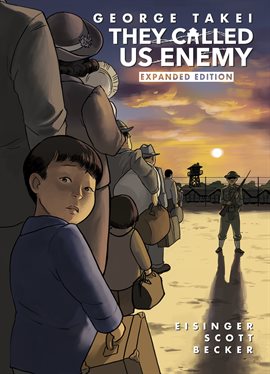

If he renounced Japan, he would be stateless. Takekuma refused to answer the former in the affirmative, and felt he could not pledge the oath of allegiance because he was not an American citizen. Army, and one in which all internees were asked to pledge an oath of loyalty to the United States. Two questions in particular caused outrage: one in which the male internees were asked if they would be willing to fight in the U.S. In January of 1943, the internees were asked to fill out a loyalty questionnaire, and many viewed this as a personal affront. George recalls fond memories of taking a day trip to a local farm, and seeing snow for the first time, as he was a small child and incapable of understanding the significance of the persecution the family was enduring. George's father was elected block manager, a representative of the prisoners in dealing with the soldiers who ran the camp. The family's cabin was hot and small, but they did their best to make it a home. The Takeis were sent first to a detainment facility at Santa Anita racetrack, where they were forced to sleep in horse stables, then on to Camp Rohwer, an internment camp in Arkansas. In response, Roosevelt signed Executive Order 9066, which resulted in Japanese Americans being forced from their homes and sent to internment camps. Politicians like Attorney General of California Earl Warren and Mayor of Los Angeles Fletcher Bowron made inflammatory statements claiming that the population of Japanese Americans living on the west coast were a threat to national security. The next day, President Roosevelt urged Congress to declare war on Japan, and they complied. On December 7, 1941, the family was decorating for Christmas when they heard an announcement about the attack on Pearl Harbor on the radio. The two ran a dry cleaning business together and had three children: George, his younger brother Henry, and their sister Nancy, who was an infant at the time of the war.

He met and married Fumiko, George's mother, who was born in the U.S. George's father, Takekuma, was born in Japan but came to the U.S. There were armed soldiers on the porch waiting for the family. The book opens with George recalling being roused from his bed by his father, who instructed him to get dressed and prepare to leave their Los Angeles home. They Called Us Enemy is a graphic memoir by actor and activist George Takei chronicling his experience living in Japanese internment camps as a child during World War II. The following version of this book was used to create this study guide: Takei, George.


 0 kommentar(er)
0 kommentar(er)
